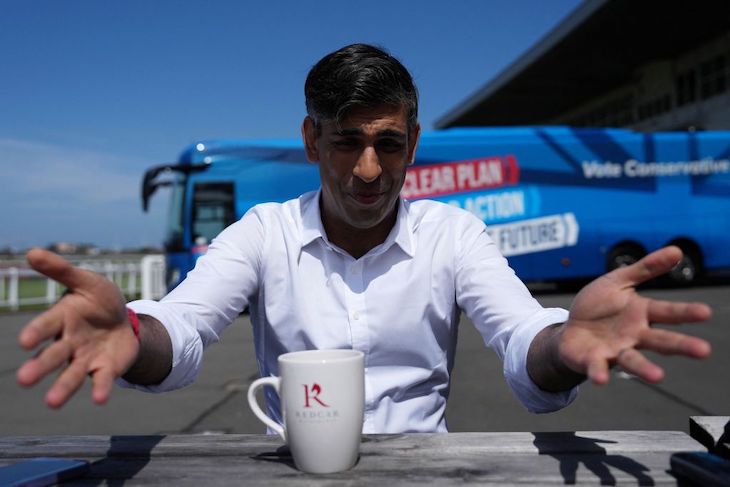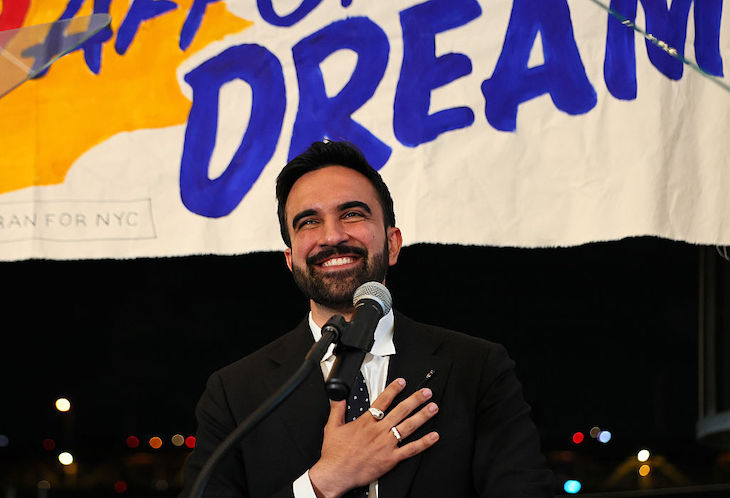As a general rule, you know your election campaign has gone off track when politicians are being asked on the broadcast round whether their leader will quit before polling day. This is what Tory minister Mel Stride encountered over the weekend on Sky News following the backlash over Rishi Sunak’s decision to miss part of the D-Day 80th anniversary commemorations on Thursday, instead returning to the UK. Stride insisted that Sunak would ‘absolutely’ lead the party until polling day – and said how sorry the ‘patriotic’ Prime Minister was for misjudging the situation.
It’s hard to find a Tory MP who believes Sunak will be leader for long after the election
While Sunak’s aides dismiss talk that he could stand down as ‘utter b—ocks’, it’s hard to find a Tory MP who believes he will be leader for long after the election. In the wake of both the D-Day backlash and Nigel Farage’s decision to return to lead the Reform party, candidates are becoming more pessimistic about their chances.
‘Expectations have lowered over the past week,’ says a senior Tory. ‘There’s not panic but instead resignation to the fact we could be sub-200 MPs by the end of this.’
In Conservative Campaign Headquarters, there is a sense that the party needs to push on – despite the setbacks – and keep going. The launch of both main parties’ manifestos this week should offer a chance to move the news agenda on and make an impact. The Tories will go first, launching their policy document on Tuesday, most likely at an event held in the Midlands. Then Labour will have its go on Thursday, after the trade unions and party officials signed off the manifesto just before the weekend.
The Tories have decided to go first in the hope that they can seize the initiative and throw down the gauntlet to Labour. The party has already announced a slew of policies in the campaign (from mandatory national service to more help for pensioners). However, there will still be new ideas, with a focus on the economy through tax (possibly another NI cut promise) and welfare. With the Rwanda asylum scheme yet to get off the ground, one area where Tories on the right want Sunak to show some leg is the European Convention on Human Rights (ECHR). James Clevery, the Home Secretary, has already said a Tory government would seek to work with allies on reforming the ECHR. I understand that the manifesto is likely to stop short of a promise to leave the ECHR, or to offer a referendum on withdrawal – instead pushing for reform. There will be a focus on how a Tory government would respond to orders from the ECHR – suggesting that all options will be on the table.
As for Labour, aides are keen to play down expectations about its manifesto, saying it will a fairly thin document which includes some new policy details on the economy, childcare and energy. Labour will give a ‘triple lock’ promise not to raise income tax, National Insurance or VAT for five years if it wins the general election. Given that the Institute for Fiscal Studies has suggested whoever is in government after the election will need to make cuts or find tax rises on current spending plans, the pledge raises more questions than it answers. However, it has been planned for some time and is part of Rachel Reeves’s long-term project to convince voters that Labour can be trusted on the economy.
Watch more analysis from Katy Balls, Kate Andrews, and James Heale on Spectator TV:
To sign up for Katy Balls’s Election Insider email click here








Comments